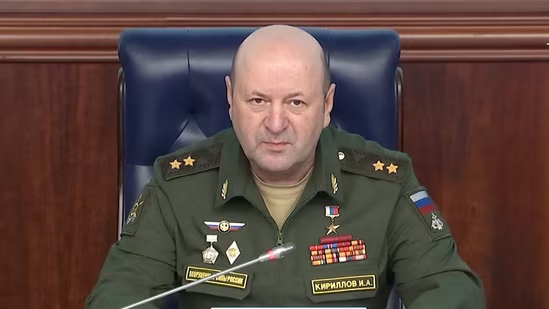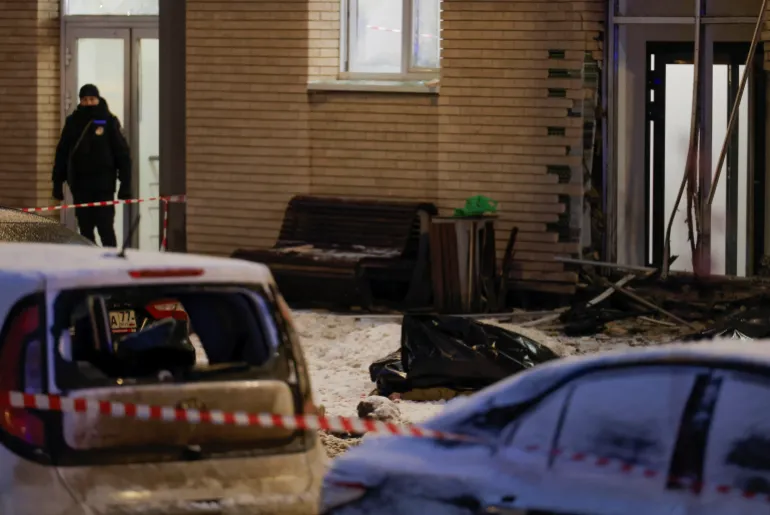The assassination of Lieutenant General Igor Kirillov, a senior Russian official overseeing nuclear protection forces, has sent shockwaves across Moscow.
A bomb hidden in an electric scooter killed Kirillov outside a residential apartment building on Ryazansky Prospekt, sparking widespread condemnation and raising critical questions about security lapses in the Russian capital.
The incident, claimed by a source within Ukraine’s Security Service (SBU), represents an alarming escalation in the ongoing tensions between Russia and Ukraine.
Russia Nuclear Defence Chief Killed in a Moscow
Lieutenant General Igor Kirillov, the chief of the Troops of Radiological, Chemical, and Biological Defence, was killed alongside his assistant on December 17, 2024.
The explosive device, reportedly with a capacity equivalent to 300 grams of TNT, detonated outside a residential building. Images from the scene depicted a shattered entrance, rubble scattered across the ground, and the lifeless bodies of the victims lying in blood-stained snow.
Residents of the complex where the bombing occurred have long complained about the lack of effective video surveillance. According to Al Jazeera’s Maria Shapovalova, the absence of functional security cameras hindered efforts to gather immediate evidence about the perpetrators. This gap in security has added to the growing concerns about Moscow’s vulnerability to such attacks.
Read : Russian tanker sinks in Black Sea Spilling 4,300 Tonnes of Oil: Watch
The SBU, speaking to various media outlets, claimed responsibility for the assassination, calling Kirillov a “legitimate target.” The Ukrainian agency accused Kirillov of being complicit in the use of banned chemical weapons during Russia’s ongoing conflict with Ukraine.
Read : Russia Plans to Create Core of New Space Station by 2030
While Ukraine’s government has not officially commented, the SBU’s admission underscores the deepening animosity between the two nations.
Russia’s Response and Accusations Against Ukraine
The attack on Kirillov follows a series of assassinations and sabotage incidents within Russia, which Moscow has repeatedly attributed to Ukraine.
High-profile cases, such as the car bombing that killed Darya Dugina in August 2022, have set a precedent for covert operations that target influential figures associated with Russia’s military and political establishment.
Dmitry Medvedev, deputy head of Russia’s Security Council, condemned the assassination, framing it as a desperate attempt by Kyiv to divert attention from its military setbacks. Medvedev vowed retribution against Ukraine’s leadership, warning of severe consequences for what he described as “terrorist tactics.”

Foreign Ministry spokesperson Maria Zakharova also criticized Western nations for their silence on the attack. She argued that the lack of condemnation reflects a broader pattern of tacit approval for Ukraine’s actions, which she labeled as war crimes.
Zakharova’s statements highlight Russia’s growing frustration with what it perceives as international complicity in supporting Ukraine’s resistance.
In response to the killing, the United States distanced itself from the incident. While State Department spokesperson Matthew Miller denied any U.S. involvement, he also denounced Kirillov’s role in alleged atrocities, including the use of chemical weapons against Ukrainian forces.
Kirillov’s Legacy and the Implications of His Death
Lieutenant General Igor Kirillov played a pivotal role in Russia’s Troops of Radiological, Chemical, and Biological Defence, a specialized unit tasked with operating under conditions of nuclear, chemical, or biological contamination.
His leadership extended to controversial activities, with international bodies and governments accusing him of deploying banned chemical weapons in Ukraine.
In October 2024, the United Kingdom sanctioned Kirillov and his forces for their reported use of riot control agents and toxic substances, including chloropicrin.
The Organisation for the Prohibition of Chemical Weapons (OPCW) prohibits the use of such agents in warfare. Despite Russia’s denial of maintaining a chemical arsenal, allegations of their deployment persist, fueling criticism of Moscow’s lack of transparency.

The Security Service of Ukraine claims to have documented over 4,800 uses of chemical weapons by Russian forces since the conflict began in February 2022. This extensive record includes the alleged use of K-1 combat grenades, further implicating Kirillov and his unit in violations of international law.
The assassination of Kirillov, therefore, carries significant implications. It not only eliminates a key figure in Russia’s military command but also serves as a symbolic blow to Moscow’s efforts to project strength in the face of mounting international scrutiny. For Ukraine, the incident represents a bold statement of resistance, signaling its ability to strike at the heart of Russia’s military infrastructure.
A Tipping Point in the Russia-Ukraine Conflict?
The killing of Kirillov marks a dangerous escalation in the ongoing Russia-Ukraine conflict. It underscores the transition of hostilities from conventional battlefields to targeted assassinations and covert operations.
Such acts, while potentially advantageous in disrupting the enemy’s command structure, carry significant risks of retaliation and further destabilization.
Russia’s investigative committee has launched a criminal case, aiming to uncover the perpetrators and their methods. However, the broader geopolitical implications of this attack are likely to dominate discussions in the coming weeks.
The use of unconventional tactics, including bombings in urban centers, signals a shift in the conflict’s dynamics, raising concerns about the safety of civilians and the potential for collateral damage.

For Moscow, the incident is a stark reminder of its vulnerabilities, even within the heavily fortified capital. The lack of adequate surveillance in the area where the attack occurred has drawn criticism from residents and analysts alike. Enhancing urban security measures will be critical in preventing future incidents and restoring public confidence.
Meanwhile, Ukraine’s alleged involvement in the assassination reflects its determination to confront Russia on multiple fronts. By targeting high-ranking officials like Kirillov, Ukraine aims to disrupt Russia’s military operations and draw international attention to the alleged war crimes committed by Russian forces.
The assassination of Lieutenant General Igor Kirillov represents a pivotal moment in the ongoing conflict between Russia and Ukraine. It highlights the intensifying use of unconventional tactics and the broader implications for regional and global security.
As investigations continue and tensions rise, the incident underscores the urgent need for dialogue and de-escalation to prevent further loss of life and the potential for an expanded conflict.

